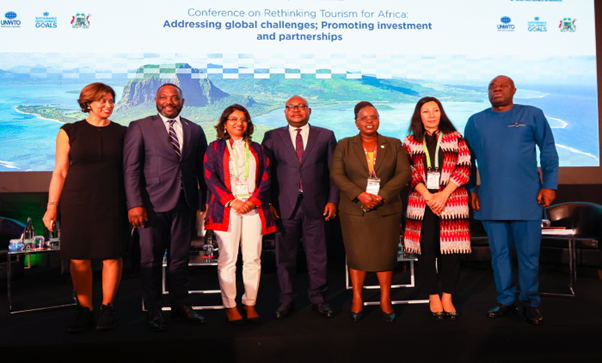Dr Nazia M. Habib was invited to give a pivotal speech and to engage at the 66th United Nations World Tourism Organization (UNWTO) Regional Commission for Africa meeting. She was the only academic invited to speak on the ministerial panel.
This year’s UNWTO Regional Commission for Africa conference discussed “Rethinking Tourism for Africa: Addressing global challenges; Promoting investment and partnerships”. Dr Habib observed the sincere demand and will power among the countries to innovate the regulatory framework. She introduced the work that the Centre for Resilience and Sustainable Development is doing on the importance of applying systems thinking alongside political and economic related decision making. She strongly suggested the national leadership needs to break silo thinking and piecemeal approaches to sustainable development.
The meeting, that brought together over 20 African Ministers of Tourism, private sector executives and three Secretary Generals (Hon. Chileshe Mpundu Kapwepwe, Secretary General of The Common Market for Eastern and Southern Africa (COMESA); The Rt Hon. Patricia Scotland KC, Secretary General of the Commonwealth; Hon. Zurab Pololikashvili, Secretary-General, World Tourism Organization (UNWTO)), itself demonstrated the rise of regional leadership in collective problem solving. Dr Habib discussed how systems thinking allows such commitment to be materialised through designing collaborative institutions. She shared evidence developed in the ‘Our Action, Their Future’ project with the Commonwealth Secretariat, which showed that regulatory and financial innovations within sustainable investment space can resolve any tension between individual wins and collective gains.
African tourism, in the post-pandemic era, has a great opportunity to reinvent their image. This could help with derisking the governments, investors and entrepreneurs looking for non-debt funding opportunities. Dr Habib discussed with participating Ministers and their executive teams the benefits of co-creating projects regionally and cross-referencing benefits beyond the regional boundaries.
Dr Habib has already received requests to pursue regional-level action research on tourism and sustainable financial mechanism building arising from this conference. This is an indication of the success of our action-research approach here at the Centre for Resilience and Sustainable Development (CRSD) at the University of Cambridge.
During the conference, the Secretary General of the Commonwealth (Rt Hon. Patricia Scotland KC) praised the centre’s contribution. She made specific reference to the above-mentioned ‘Their Future, Our Action’ project, which has been contributing to the economic resilience of small states.
Two critical contributions stemming from the ‘Their Future, Our Action’ research were mentioned, as she suggested that these tools could prove beneficial to African nations. The ‘Common Pool Asset Structuring Strategy’ (COMPASS), which merges individual financial applications into country-wide possibilities, and the Political-Economic Resilience Index (PERI-View), which provides reliable data on small states’ economic and vulnerability levels, thereby increasing their appeal to investors. Rt Hon. Patricia Scotland KC also mentioned that there are some insights in the Cambridge-Commonwealth research partnership that may be applied to the African tourism context where sustainable development needs to be funded by investment without increasing the debt burden. The following press release mentions this: Commonwealth Secretary-General urges joint effort at World Tourism Organization’s Africa Summit.
The Centre for Resilience and Sustainable development (CRSD) is actively advocating for reforms in global financing rules to make development and climate finance more accessible to smaller states. There is more than enough evidence that sustainable development, youth engagement, climate action, and fortifying tourism resilience can work together and that responsible institutions can co-create solutions, evaluation frameworks and monitoring principles to materialise individual country level wins and collective gains at the regional level.

From left to right: Mrs Zain Verjee, Founder and CEO of the ZVG; Dr Nazia M Habib, Founder and Director of the Center for Resilience and Sustainable Development; Hon. Rhodney Sikumba, Cabinet Minister of Tourism and Arts, Republic of Zambia.

From left to right: Mrs. Zain Verjee, Founder & CEO the ZVG; Hon. Rhodney Sikumba, Cabinet Minister of Tourism and Arts, Republic of Zambia; Dr Nazia M Habib, Founder and Director of the Center for Resilience and Sustainable Development (CRSD), University of Cambridge, UK; Hon. Didier Mazenga Mukanzu, Minister of Tourism, Democratic Republic of Congo; Hon. Peninah Malonza, Cabinet Secretary for Tourism, Wildlife and Heritage, Republic of Kenya; Hon. Lisa S. Singh, UN Resident Coordinator for Mauritius and Seychelles, United Nations; Hon. Dr. Mohammed Ibrahim Awal, Minister of Tourism, Arts and Culture, Republic of Ghana.

